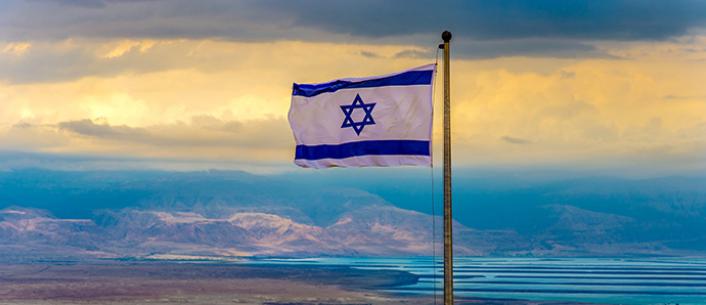- Home
- Play & Learn Home
- Online Enrichment
- Experience Modern Israel
- Israel It's Complicated
- Jewish and Me
- Jewish Holidays Jewish Values
- Jewish Values in Genesis and Jewish Values in Exodus
- Min Ha’aretz
- Our Place in the Universe
- Simply Seder
- The Prophets: Speaking Out for Justice
- Making T'filah Meaningful
- Make, Create, Celebrate
- Yom Haatzmaut Resources
- Hebrew Apps
- About The OLC
- What is the OLC?
- Introduction
- Get Started
- Resources
- OLC Content
- Parent Materials
- See My OLC Classes
- Store
Yom Ha'atzma'ut Planning with Israel-Themed Resources
Written by Behrman House Staff, 14 of April, 2017
Israel celebrates its 69th birthday on May 2. We've rounded up some sample lesson and activity ideas to help you mark the occasion.
For elementary students
Welcome to Israel! - Introduce students to Israel's history and geography, as well as its political, commercial, and cultural life. Meet Israeli kids: what they do for fun, their favorite sports and foods, and what their schools are like. Israel's struggle to coexist peacefully with its neighbors is presented in a thoughtful and age-appropriate way.
Teach students the words to "Hatikvah," Israel's national anthem. The English translation begins:
Within the heart
A Jewish spirit is still alive
And the eyes look eastward
Toward Zion.
Our hope is not lost,
The hope of 2,000 years
To be a free nation in our land
In the land of Zion and Jerusalem.
Ask students:
Can you imagine what it is like to hope and dream about something for 2,000 years?
What do the words of "Hatikvah" tell you about the Jewish people's continuing love of Israel?
How do you think our love of Israel helps Jews aroudn the world - despite the great distances between us - remain as one united community?
For middle grade students
Experience Modern Israel - in book form with a digital companion - helps immerse students in all aspects of Israel today, including meeting the diverse people who live there, debating Israel's responses to its challenges, and beginning to develop a personal relationship with the Jewish homeland.
Yom Ha'atzma'ut is the perfect time for a lesson on the origin of Israel's name, and to learn the difference between Am Yisrael, Eretz Yisrael, and M'dinat Yisrael.
Materials needed: Large piece of poster board, markers, and copies of Genesis 32:23-31
Lesson:
1. (5 minutes) Introduce the concept of chevruta study (the Jewish practice of studying text with a friend. Chaver = friend). Break students into chevruta.
2. (15 minutes) Distribute copies of Genesis 32:23-31, the story of Jacob wrestling the angel. Students work in pairs to read the text and answer: Who are the characters in the story? Who does Jacob think was the man he encountered? Why was Jacob's name changed? What do you think the name Yisrael means?
Reconvence as a class to discuss. Explain that Yisrael means "He who wrestles with God." Ask students how Jews wrestle with God.
3. (5 minutes) Ask students what the importance of Israel is in the Torah. Direct them to find three major links to Israel (the land God promised our ancestors, the land to which Moses led the Jewish people, where King Solomon built the Temple.)
4. (5 minutes) Explain that Israel is full of places that have biblical significance. Refer students to the Time Travel exercise on page 11 of Experience Modern Israel, then have them locate the sites on a classroom map of Israel.
5. (10 minutes) On the board, write Am Yisrael, Eretz Yisrael, and M'dinat Yisrael as headings of three columns. Explain what they mean. As a class, categorize each of the following terms: B'nai Yisrael (Am); The Kingdom of Israel (Eretz); Knesset (M'dinat); Tel Aviv (M'dinat); Promised Land (Eretz); Sh'ma Yisrael (Am); others you can think of.
For teens
Israel Matters - Help students dig deeply into the political, cultural, and historical forces facing the Jewish state. Written by Middle East authority Mitchell Bard, Israel Matters provides historical context and fact-based answers to that will help both teens and adults appreciate the complexity of the country and develop and advocate for a balanced view of Israel. Use it in full, or selected chapters, to begin conversations with your students.
Some ideas:
Compare the Israeli Declaration of Independence to the U.S. Declaration of Independence. How are they alike, and how are they different?
Create multiple "political parties" among your group and hold an election similar to the parliamentary elections in Israel. Does any one group win a majority? How would you form a coalition in order to achieve a majority?
You are the newly elected president of the United States. You have watched the last three presidents struggle as they tried and failed to help broker a final deal between Israeli and Palestinian leaders. How would you approach the issue?


